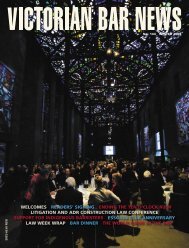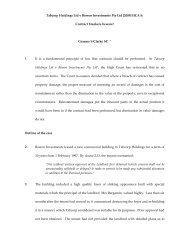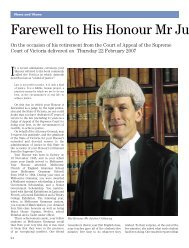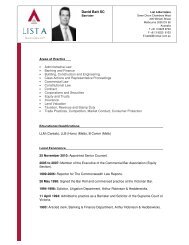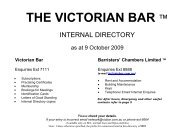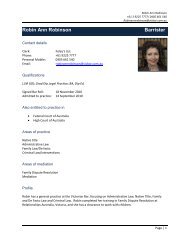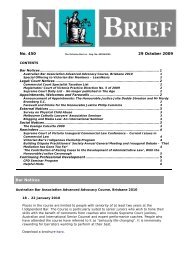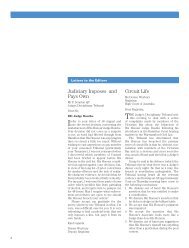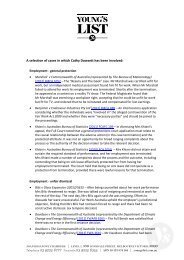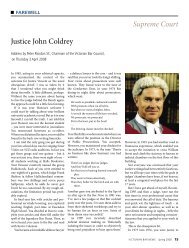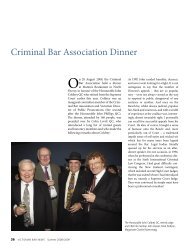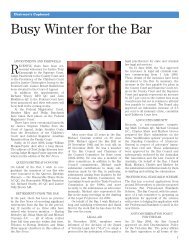Justice William Charles Crockett AO - Victorian Bar
Justice William Charles Crockett AO - Victorian Bar
Justice William Charles Crockett AO - Victorian Bar
- No tags were found...
Create successful ePaper yourself
Turn your PDF publications into a flip-book with our unique Google optimized e-Paper software.
News and ViewsThe Problematic Proviso:The Vice of WeissPhillip Priest QC *IN his retirement speech on 22 February2007, <strong>Justice</strong> Callaway made it plainthat one of the factors motivating hisdecision to retire from the Court of Appealwas the High Court’s judgment in Weiss vThe Queen (2005) 80 ALJR 444; 223 ALR662; [2005] HCA 81.He is not alone in his expressed dismay.Weiss caused a shockwave to sweepthrough the ranks of criminal appellatelawyers and judges. The High Courtradically altered the ambit of the proviso,sweeping away decades of accepted wisdom.It is argued in this article that in reachingits conclusions in Weiss the High Courtignored many decisions of authority.Doubtful implications were drawn fromthe historical roots of the statutory formula.Indeed, the main premise underpinningthe High Court’s decision is dubious.The unfortunate result is that theapplication of the proviso is now fraughtwith unnecessary difficulty. For the sakeof intermediate appellate courts the HighCourt urgently needs to rethink Weiss.Before turning to the decision itself, itis necessary to examine the legislative andhistorical context in which the case fell tobe decided.32THE WORDS OF THE PROVISOWeiss was concerned with the proviso(venerably so called) found in s.568(1)of the Crimes Act 1958 (Vic.), whichprovides:(1) The Court of Appeal on any such appealagainst conviction shall allow the appealif it thinks that the verdict of the juryshould be set aside on the ground that itis unreasonable or cannot be supportedhaving regard to the evidence or that thejudgment of the court before which theappellant was convicted should be set*With thanks to Sarah Leighfield of the <strong>Victorian</strong><strong>Bar</strong>.Phillip Priest QC.aside on the ground of a wrong decisionof any question of law or that on anyground there was a miscarriage of justiceand in any other case shall dismiss theappeal:Provided that the Court of Appealmay, notwithstanding that it is ofopinion that the point raised in theappeal might be decided in favourof the appellant, dismiss the appealif it considers that no substantialmiscarriage of justice has actuallyoccurred. [Emphasis added.]The origins of the proviso in s.568(1)can be found in s.4(1) of the CriminalAppeal Act 1907 (UK). Its equivalent isto be found in the criminal appeal statutesof nearly all Australian States andTerritories. 1 There is a New Zealand 2 anda Canadian 3 equivalent.Three points concerning the structureof s.568(1) should be noted at the outset.First, on an appeal against conviction, theappellate court shall allow the appeal if itthinks:• the “verdict of the jury” should be setaside on the ground that it is “unreasonableor cannot be supported havingregard to the evidence”; or• the judgment of the court before whichthe appellant was convicted should beset aside on the ground of a “wrongdecision of any question of law”; or• that on any ground there was a “miscarriageof justice”.Secondly, if one of these grounds issatisfied, the proviso then comes intoplay. Thus, if the court is of the opinionthat the point raised in the appeal mightbe decided in favour of the appellant(presumably on the ground that there wasa “wrong decision of any question of law,or on any ground there was a miscarriageof justice),” it may dismiss the appeal ifsatisfied that “no substantial miscarriageof justice” has actually occurred. 4Thirdly, as a matter of logic — ifnothing else — the proviso can haveno application to the first ground uponwhich an appeal shall be allowed i.e. thatthe verdict of the jury is unreasonable orcannot be supported having regard to theevidence, since that is the statutory basisupon which jury verdicts are set aside as“unsafe and unsatisfactory” 5 . If a jury verdictfalls into that category, obviously itcannot be saved by the proviso. 6 However,as will be seen, the ratio of Weiss may, onone view, render this ground somewhatsuperfluous.INTERPRETATION OF THE PROVISOPRE-WEISSUntil Weiss, the analysis of Fullagar J inMraz v The Queen (1955) 93 CLR 493 at514 generally was regarded as the classicexposition of the operation of the proviso.He said:It is very well established that the provisoto s.6(1) [of the Criminal Appeal Act 1912(NSW)] does not mean that a convictedperson, on an appeal under the Act, must



